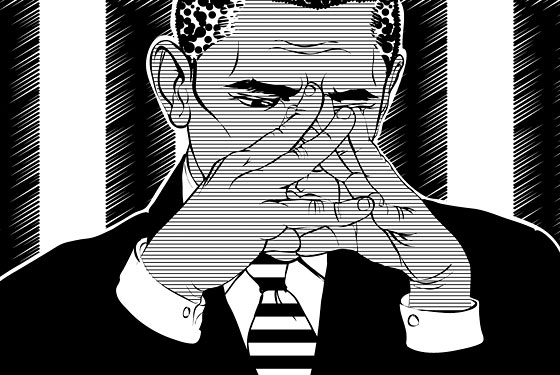
Last week, Barack Obama gave what was doubtless the sleepiest speech of his career. The most charitable explanation, which coincides with the most likely, is that he had an impossible task before him, having to walk the line between condemning a bloody war he never believed in and praising the men and women who bravely fought it. But surely the entire speech didn’t have to be so rote. It never tookoff because the president simply transitioned from one familiar, intractable, inherited woe—the war—to another, the bum economy: “We must tackle those challenges at home with as much energy, and grit, and sense of common purpose.”
The question is why he steered the discussion in this direction, rather than toward the real (GOP) elephant in the room: this ginned-up populism sweeping the country, fueled by a creepy resurgence of racism and xenophobia. A discussion about the drawdown in Iraq—whose invasion hardly endeared us to the Muslim world—could just as easily have lent itself to a discussion about domestic issues of the same stripe, like the furor over the “ground-zero mosque”; the record numbers of Americans who believe Obama practices Islam (18 percent, according to Pew, and 31 percent of all Republicans); the GOP’s exploitation of this myth (Mitch McConnell slyly fueled it on Meet the Press two weeks ago); the Glenn Beck rally on the anniversary of Martin Luther King Jr.’s “I have a dream” speech; the forced resignation of Shirley Sherrod at the USDA over a doctored “anti-white” video. Obama has already muffed two of these, with the ouster of Sherrod and his retreat from a defense of the mosque. But he could have used last week’s address to make amends. Lord knows these issues are close to his heart. And they can be good politics: The moderate middle usually recoils from social-conservative ugliness once it’s highlighted for what it is.
In the past, Obama has had tremendous success by doing what was contraindicated (a 37-minute speech about race, for instance) and appealing to our better angels. As he noted after the arrest of Henry Louis Gates Jr., moments of racial tension and misunderstanding can be teachable, too. Yet the summer’s been lousy with those moments, and he’s repeatedly declined to step up. Why he’s cowered from the public when ubiquity used to be his stock-in-trade—to the point that he earned himself comparisons to Law & Order reruns—is what remains such a mystery, and such a source of Democratic heartbreak going into the fall.
Perhaps Obama finds all the loony-town venom too distasteful to respond to in kind. But he heard tons of it on the campaign trail—including from Hillary, whose coy words about his faith were nearly identical to McConnell’s (“I take him on the basis of what he says”)—and he always found dignified ways to answer. Surely, if Bill Clinton were sustaining the same slings and arrows, he’d be out there, every day, glad-handing his way through the mobs who called him names, drawing power from the energy of the opposition.
But that’s the thing about Obama: He’s more human than politician. The need for approval isn’t really what animates him. Those family photos in the Oval Office, which mutely dominated his address, underscored this point. In the end, Obama is a private man occupying the most public role in the world. Crowds don’t give him the strength they give other politicians, for better or worse—he doesn’t seem to need them. When he was a senator, he would often imply that he got elected by a fluke—his most formidable opponents in the primary and general elections in Illinois self-destructed—and to some degree, it was a fluke (an economic crisis) that washed him into the White House. That same wave now drowns him.
None of this means that Obama lacks political instincts and aggression. They’re what enabled him to beat Hillary in 2008 and to pass a health-care bill this spring. Perhaps his finest political asset is self-restraint. He listens to his own rhythms, not others’, and responds to opponents only when they’ve played themselves out. (Call it the Braveheart strategy: Hold … hold … hold …!) So it’s still possible that Obama will come out swinging this fall.
But it’s possible, too, that Obama is the one who’s spent. We hardly ever consider that our presidents might simply be fried. In Obama’s case, we assumed inspirational rhetoric would be a constant—that even when policy changes weren’t possible, he’d be trying to change hearts and minds. The sad irony is that Obama has changed plenty. He delivered historic health-care legislation and passed finance reform and stopped the economy from soaring off a cliff. Yet his approval numbers are sinking, his audiences are dwindling, and the nasty chatter about him is spreading like a sickness. He can’t shake W.’s troubles, he can’t shake a legacy of oil-rotten misery in two different gulfs. Maybe that’s Obama’s heartbreak. And it finally shows.
Have good intel? Send tips to intel@nymag.com.